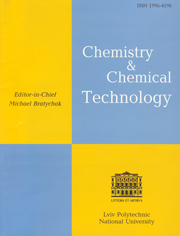Self-cured polymers from non-drying oil
| Attachment | Size |
|---|---|
| 640.28 KB |
[1] Lligadas G., Ronda J., Galia M. and Cadiz V.: Biomacromolecules, 2007, 8, 686.
https://doi.org/10.1021/bm060977h
[2] Andjelkovic D. and Lorock R.: Biomacromolecules, 2006, 7, 927.
https://doi.org/10.1021/bm050787r
[3] Narine S., Yue J. and Kong X.: J. Am. Oil. Chem. Soc., 2007, 84, 173.
https://doi.org/10.1007/s11746-006-1021-5
[4] Czub P.: Macromol. Sym., 2006, 245, 533.
https://doi.org/10.1002/masy.200651377
[5] Guner F., Yagci Y. and Erciyes A.: Prog. Polym. Sci., 2006, 31, 633.
https://doi.org/10.1016/j.progpolymsci.2006.07.001
[6] Petrovic Z., Zhang W. and Janvi I.: Biomacromolecules, 2005, 6, 713.
https://doi.org/10.1021/bm049451s
[7] Derksen J., Cuperus F. and Kolster P.: Prog. Org. Coat., 1996, 27, 45.
https://doi.org/10.1016/0300-9440(95)00518-8
[8] Sharmin E., Ashraf S. and Ahmad S.: Int. J. Bio. Macromol., 2007, 40, 407.
https://doi.org/10.1016/j.ijbiomac.2006.10.002
[9] Ahmad S., Ashraf S., Naqvi F. et al.: J. Macromol. Sci. Part A: Pure Appl. Chem., 2006, 43, 1409.
https://doi.org/10.1080/10601320600820280
[10] Bailey A.: Bailey's industrial oil and fat product. Wiley, New York 1996.
[11] Deffar D., Teng G. and Soucek M.: Surf. Coat. Int. Part B: Coat. Trans., 2001, 84 (B2), 147.
https://doi.org/10.1007/BF02699777
[12] Gorkum R. and Bouwman E.: Coord. Chem. Rev., 2005, 249, 1709.
https://doi.org/10.1016/j.ccr.2005.02.002
[13] Kabasakal O.: Prog. Org. Coat., 2005, 53, 235.
https://doi.org/10.1016/j.porgcoat.2005.02.011
[14] Erich S., Vander Ven L., Huinink H. et al.: J. Phys. Chem. B., 2006, 110, 8166.
https://doi.org/10.1021/jp057148v
[15] Ahmad S., Ashraf S., Naqvi F., et al.: Prog. Org. Coat., 2006, 56, 1.
https://doi.org/10.1016/j.porgcoat.2005.08.015
[16] Zafar F., Ashraf S. and Ahmad S.: Bhart. Viag. Odhyo. Anusan. Patri., 2007, 1, 44.
[17] Ahmad S., Ashraf S., Naqvi F. et al.: Prog. Org. Coat., 2003, 47, 95.
https://doi.org/10.1016/S0300-9440(03)00015-8
[18] Kaul S., Saxena R., Kumar A. et al.: Fuel Proc. Technol., 2007, 88, 303.
https://doi.org/10.1016/j.fuproc.2006.10.011
[19] Raval D. and Patel V.: Paintindia, 2005, LV (3), 51.
[20]http://www.google.com/search?hl=en&lr=&q=H+S+Mukunda%2C+100+%25+Of+Energ...
[21] Zafar F., Ashraf S. and Ahmad S.: J. Appl. Polym. Sci., 2007, 104, 1143.
https://doi.org/10.1002/app.25774
[22] Zafar F., Sharmin E., Ashraf S. and Ahmad S.: J. Appl. Polym. Sci., 2004, 92, 2538.
https://doi.org/10.1002/app.20218
[23] Zafar F., Ashraf S. and Ahmad S.: Prog. Org. Coat., 2004, 51, 250.
https://doi.org/10.1016/j.porgcoat.2004.08.003
[24] Zafar F., Sharmin E., Ashraf S. and Ahmad S.: J. Appl. Polym. Sci., 2005, 97, 1818.
https://doi.org/10.1002/app.21953
[25] Morrison R. and Boyd R.: Organic Chemistry, 6th edn. Prentice Hall, India 2000.
[26] Silverstein R., Bassler G and Morril T.: Spectrometric Identification of Organic Compounds, 5th edn. John Wiley and Sons, New York 1991.
[27] Paul S.: Surface Coatings Science and Technology, 2nd edn. John Wiley and Sons, New York 1996.
[28] Nylen P. and Sunderland E.: Modern Surface Coating, 1st edn. Wiley, London 1965.
[29] Gwariker V., Viswanathan N. and Sreedhar J.: Polymer Science. New Age International Publisher, New Delhi, India 2006.










